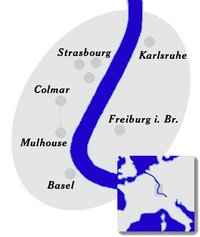EUCOR and its evolution over time
The EUCOR treaty was ceremoniously signed in front of rolling cameras in Basel on 13 December 1989, in a building that had served during the eighteenth-century as a post office and trading house. The signatories took their turn following the age of their universities: first Albert-Ludwigs-Universität in Freiburg, followed by the University of Basel, then the Université Louis Pasteur de Strasbourg, and finally, the Université de Haute Alsace de Mulhouse, founded in 1975.
EUCOR stand for the Confederation of Upper Rhine Universities. Created in 1989, it brings together the Upper Rhine region’s seven very differently structured and sized universities into a “European Confederation.” For those with an education based on the Greek and Latin classics, the abbreviation EUCOR can evoke two possible associations: COR recalls the Latin word for heart, and EU the Greek word for good.
The primary aim is to foster cooperation in university teaching and research in the “espace rhenan.” In the two decades since EUCOR was founded, shifts in activities, surrounding conditions, and proponents have been evident. One particular focus of interest has been the relationship of this cross-border partnership to the higher education policies in each country, in addition to the relationship of this regional, small-scale collaboration within the framework of wider European structures.
What makes EUCOR unique is that it seeks to facilitate cooperation without any need to unite its member institutions, and to overcome borders without wanting to abolish them. The term “confederation,” borrowed from the Swiss context, seemed appropriate to capture this endeavor. The intention is limited but specific: to create opportunities for existing potential to unfold. Hence even if some expressed broader ambitions during the founding of the academic confederation, while some in the press even spoke about the cooperation as a kind of regional university, EUCOR was never intended to be a superuniversity or a merger leading to a “université européenne.” EUCOR was intended to be European, however, insofar as it respects its diversity of traditions and cultures.
Expanding the collaboration
In 2009, celebrating its twentieth anniversary, EUCOR could look back on a number of successful interregional collaborations. One important example has been the creation of trinational degree programs. Since 1989, for instance, it has been possible to study biotechnology in Strasbourg in a cross-border program: faculty from the five universities participating in EUCOR offer multilingual instruction, while students earn a degree recognized in all three countries. The joint master’s program in neuroscience – a trinational degree offered by the Universities of Basel, Freiburg, and Strasbourg – also continues to be a success. The new bachelor’s program Regio Chemica was introduced in 2010, offered in Mulhouse and intended especially to foster the interregional networking of education, research, and industry. With programs of this kind, the universities comprising EUCOR are responding to the increasingly global orientation of local companies, while preparing students for the international job market. The humanities, too, have benefited from this interregional cooperation. One particularly notable example is the bilingual, trinational master’s program in classical studies, which came about through a collaboration among the four departments of classical studies at the universities of Basel, Freiburg, Mulhouse, and Strasbourg to found the teaching and research network Collegium Beatus Rhenanus.
Despite its demonstrated successes, however, EUCOR remains a project that can and should still be optimized. One major concern for the anniversary year 2019 was to improve collaboration in programs for early-career scholars and to create a common framework for doctoral studies. A goal was set, for instance, to create joint doctoral colloquia and programs and eventually to harmonize regulations for doctoral study. The fact that opportunities for cross-border mobility in the Upper Rhine region have only met with modest interest among students can likely be traced to other factors: in the anniversary year of 2009, for instance, the rectors and presidents of the five participating universities issued a joint declaration announcing their intention to work harder in overcoming language barriers, reducing the price of transportation, and, last but not least, striving to align academic calendars.



